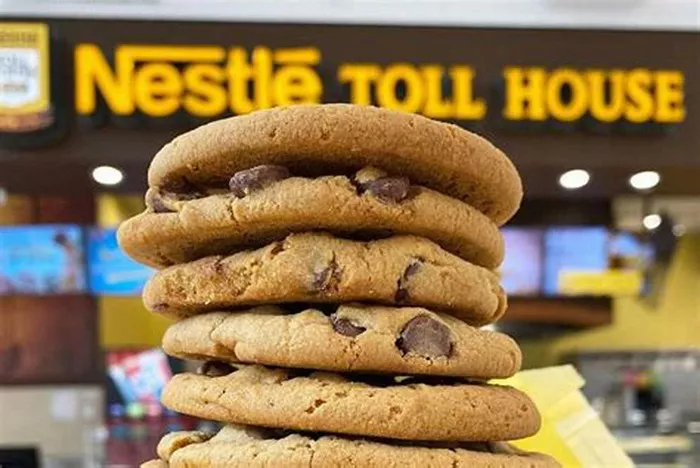Nestlé Toll House is a globally recognized brand synonymous with delicious baked goods, particularly its iconic chocolate chip cookies. Established in 1930 by Ruth Wakefield, Nestlé Toll House has become a household name, cherished for its high-quality ingredients and timeless recipes. Over the years, Nestlé Toll House has expanded its offerings to include a variety of baked goods, frozen treats, and café-style beverages, catering to the evolving tastes of consumers worldwide.
Toll House Franchise Initial Investment
Investing in a Toll House franchise offers entrepreneurs a lucrative opportunity to capitalize on the brand’s reputation and popularity. However, like any business venture, it requires a substantial initial investment. The initial investment for a Toll House franchise typically includes:
1. Franchise Fee: The franchise fee serves as the entry ticket to join the Toll House family and gain access to its established brand, operating systems, and support network. This fee can vary depending on factors such as location and market demand but generally ranges from $25,000 to $40,000.
2. Real Estate: Securing an ideal location is crucial for the success of a Toll House franchise. The cost of real estate varies significantly based on factors such as geographic location, size, and market demand. Entrepreneurs should budget for lease or purchase expenses, which can range from $50,000 to $500,000 or more, depending on the location’s desirability and market conditions.
3. Construction and Renovation: Transforming the chosen location into a welcoming and functional Toll House bakery café requires investment in construction and renovation. Costs may include leasehold improvements, interior décor, signage, and equipment installation, ranging from $100,000 to $300,000 or more, depending on the scope of work and local regulations.
4. Equipment and Inventory: Equipping the bakery café with state-of-the-art baking equipment, display cases, refrigeration units, and initial inventory is essential for seamless operations. The cost of equipment and inventory can vary depending on the size and scale of the franchise but typically ranges from $50,000 to $100,000.
5. Training and Support: Toll House provides comprehensive training programs to franchisees and their staff, ensuring they have the knowledge and skills to deliver exceptional products and service. The cost of training and ongoing support is typically included in the initial investment and can range from $5,000 to $20,000.
Toll House Franchise Ongoing Expenses
In addition to the initial investment, running a Toll House franchise entails ongoing expenses to maintain operations and sustain profitability. These ongoing expenses may include:
1. Royalty Fees: As a franchisee, you are required to pay ongoing royalty fees to the franchisor, typically calculated as a percentage of gross sales. Royalty fees for Toll House franchises generally range from 4% to 6% of gross sales, providing access to ongoing support, brand updates, and marketing initiatives.
2. Marketing and Advertising: Building brand awareness and driving customer traffic are essential for the success of any franchise business. Toll House franchisees contribute to national and local marketing and advertising efforts through cooperative advertising funds or marketing fees, which typically range from 1% to 3% of gross sales.
3. Labor Costs: Hiring and retaining skilled staff is critical for delivering quality products and service. Labor costs, including wages, benefits, and payroll taxes, can vary depending on factors such as location, labor market conditions, and business volume.
4. Utilities and Overhead: Operating a bakery café requires utilities such as electricity, water, and gas, as well as overhead expenses such as rent, insurance, and maintenance. These costs can vary depending on the size of the facility, geographic location, and seasonal fluctuations.
5. Inventory and Supplies: Maintaining adequate inventory levels of ingredients, packaging materials, and other supplies is essential for uninterrupted operations. Franchisees must budget for ongoing inventory and supply expenses, which can fluctuate based on factors such as product demand and market trends.
Toll House Franchise Financial Projections and ROI
While the initial investment and ongoing expenses of a Toll House franchise may seem significant, careful financial planning and diligent management can lead to a favorable return on investment (ROI). Financial projections for a Toll House franchise may vary depending on factors such as location, market conditions, and operational efficiency. However, a well-executed business plan can yield attractive financial returns over time.
1. Revenue Potential: Toll House franchises have the potential to generate substantial revenue through sales of baked goods, beverages, and related products. Revenue projections should take into account factors such as foot traffic, average transaction size, and seasonal fluctuations.
2. Profit Margins: With proper cost management and pricing strategies, Toll House franchises can achieve healthy profit margins on their products and services. Analyzing profit margins across different product categories can help optimize pricing and maximize profitability.
3. Break-Even Analysis: Determining the break-even point is essential for assessing the financial viability of a Toll House franchise. The break-even analysis considers fixed and variable costs to determine the level of sales needed to cover expenses and start generating profits.
4. Return on Investment (ROI): ROI measures the profitability of an investment relative to its cost and is a key metric for evaluating the financial performance of a Toll House franchise. Calculating ROI involves comparing the net profit generated by the franchise to the initial investment and expressing the result as a percentage.
5. Financial Sustainability: Beyond ROI, financial sustainability involves maintaining consistent profitability and cash flow to support ongoing operations, expansion, and future growth initiatives. Implementing sound financial management practices and monitoring key performance indicators can help ensure the long-term success of a Toll House franchise.
Conclusion
In conclusion, investing in a Toll House franchise offers entrepreneurs the opportunity to leverage a well-established brand and proven business model in the lucrative baked goods industry. While the initial investment and ongoing expenses may require careful financial planning, the potential for attractive returns on investment and long-term profitability make Toll House franchises an appealing option for aspiring business owners. By conducting thorough cost analysis, developing realistic financial projections, and implementing effective management strategies, entrepreneurs can position themselves for success in the competitive franchise market.

